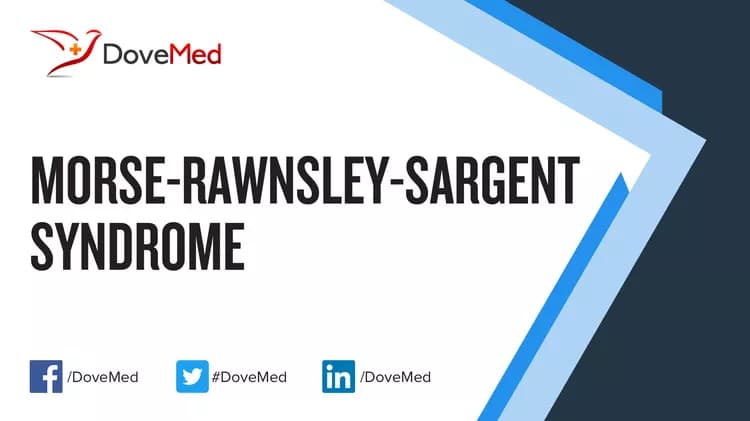What are the other Names for this Condition? (Also known as/Synonyms)
- Holoprosencephaly with Fetal Akinesia/Hypokinesia Sequence
- Holoprosencephaly-Hypokinesia Syndrome
- Holoprosencephaly-Hypokinesia-Congenital Contractures Syndrome
What is Morse-Rawnsley-Sargent Syndrome? (Definition/Background Information)
- Morse-Rawnsley-Sargent Syndrome or Holoprosencephaly-Hypokinesia Syndrome is an extremely rare and fatal central nervous system malformation occurring during embryogenesis, presenting prenatally with holoprosencephaly and fetal hypokinesia as major features
- Other manifestations include:
- Microcephaly
- Multiple contractures and intrauterine growth restriction
- There have been no further descriptions in the literature since 1988
(Source: Holoprosencephaly-hypokinesia-congenital contractures syndrome; Orphanet, National Institute of Health and Medical Research (INSERM), Paris.)
Who gets Morse-Rawnsley-Sargent Syndrome? (Age and Sex Distribution)
- Morse-Rawnsley-Sargent Syndrome is an extremely rare congenital disorder, with presentation of symptoms reported in the fetal stage
- From reported cases, it appears that the condition is predominantly observed in males
What are the Risk Factors for Morse-Rawnsley-Sargent Syndrome? (Predisposing Factors)
- A positive family history may be an important risk factor, since Morse-Rawnsley-Sargent Syndrome can be inherited
- Currently, no other risk factors have been clearly identified for this syndrome
It is important to note that having a risk factor does not mean that one will get the condition. A risk factor increases one’s chances of getting a condition compared to an individual without the risk factors. Some risk factors are more important than others.
Also, not having a risk factor does not mean that an individual will not get the condition. It is always important to discuss the effect of risk factors with your healthcare provider.
What are the Causes of Morse-Rawnsley-Sargent Syndrome? (Etiology)
- The exact cause of Morse-Rawnsley-Sargent Syndrome is not known at the present time
- Based on affected individuals being males, with some related through females in the family, it appears that the condition is inherited in an X-linked manner
X-linked recessive pattern: The gene associated with this condition is located on the X chromosome, which is one of the two sex chromosomes. In males (who have only one X chromosome), one altered copy of the gene in each cell is sufficient to cause the condition. In females (who have two X chromosomes), a mutation would have to occur in both copies of the gene to cause the disorder. Because it is unlikely that females will have two altered copies of this gene, males are affected by X-linked recessive disorders much more frequently than females. A characteristic of X-linked inheritance is that fathers cannot pass X-linked traits to their sons.
What are the Signs and Symptoms of Morse-Rawnsley-Sargent Syndrome?
The signs and symptoms of Morse-Rawnsley-Sargent Syndrome may include:
- Fetal akinesia sequence
- Aplasia/Hypoplasia of the lungs
- Decreased fetal movement
- Holoprosencephaly
- Limitation of joint mobility
- Microcephaly
- Multiple joint contractures
- Camptodactyly of finger
- Enlarged thorax
- Low-set ears
- Short neck
- Sloping forehead
- Abnormal dermatoglyphics
- Abnormality of the diencephalon
- Adducted thumb
- Aplasia/Hypoplasia of the cerebellum
- Aplasia/Hypoplasia of the corpus callosum
- Blepharophimosis
- Cerebral cortical atrophy
- Deeply set eye
- Hydranencephaly
- Intrauterine growth retardation
- Renal hypoplasia/aplasia
(Source: Morse-Rawnsley-Sargent Syndrome; Genetic and Rare Diseases Information Center (GARD) of National Center for Advancing Translational Sciences (NCATS), USA.)
How is Morse-Rawnsley-Sargent Syndrome Diagnosed?
Morse-Rawnsley-Sargent Syndrome is diagnosed on the basis of the following information:
- Complete physical examination
- Thorough medical history evaluation
- Assessment of signs and symptoms
- Laboratory tests
- Imaging studies
- Biopsy studies, if necessary
- Autopsy studies
Many clinical conditions may have similar signs and symptoms. Your healthcare provider may perform additional tests to rule out other clinical conditions to arrive at a definitive diagnosis.
What are the possible Complications of Morse-Rawnsley-Sargent Syndrome?
The complications of Morse-Rawnsley-Sargent Syndrome may include:
- Reduced fetal activity
- Inability to survive in the fetal stage
Complications may occur with or without treatment, and in some cases, due to treatment also.
How is Morse-Rawnsley-Sargent Syndrome Treated?
Morse-Rawnsley-Sargent Syndrome is a lethal condition, and at the present time, no treatment methods are reported
How can Morse-Rawnsley-Sargent Syndrome be Prevented?
Currently, Morse-Rawnsley-Sargent Syndrome may not be preventable, since it is a genetic disorder.
- If there is a family history of the condition, then genetic counseling will help assess risks, before planning for a child
- Active research is currently being performed to explore the possibilities for treatment and prevention of inherited and acquired genetic disorders
Regular medical screening at periodic intervals with tests and physical examinations are recommended.
What is the Prognosis of Morse-Rawnsley-Sargent Syndrome? (Outcomes/Resolutions)
- The prognosis of Morse-Rawnsley-Sargent Syndrome is poor. The condition is fatal, resulting in fetal demise
Additional and Relevant Useful Information for Morse-Rawnsley-Sargent Syndrome:
The following DoveMed website link is a useful resource for additional information:
Related Articles
Test Your Knowledge
Asked by users
Related Centers
Related Specialties
Related Physicians
Related Procedures
Related Resources
Join DoveHubs
and connect with fellow professionals


0 Comments
Please log in to post a comment.